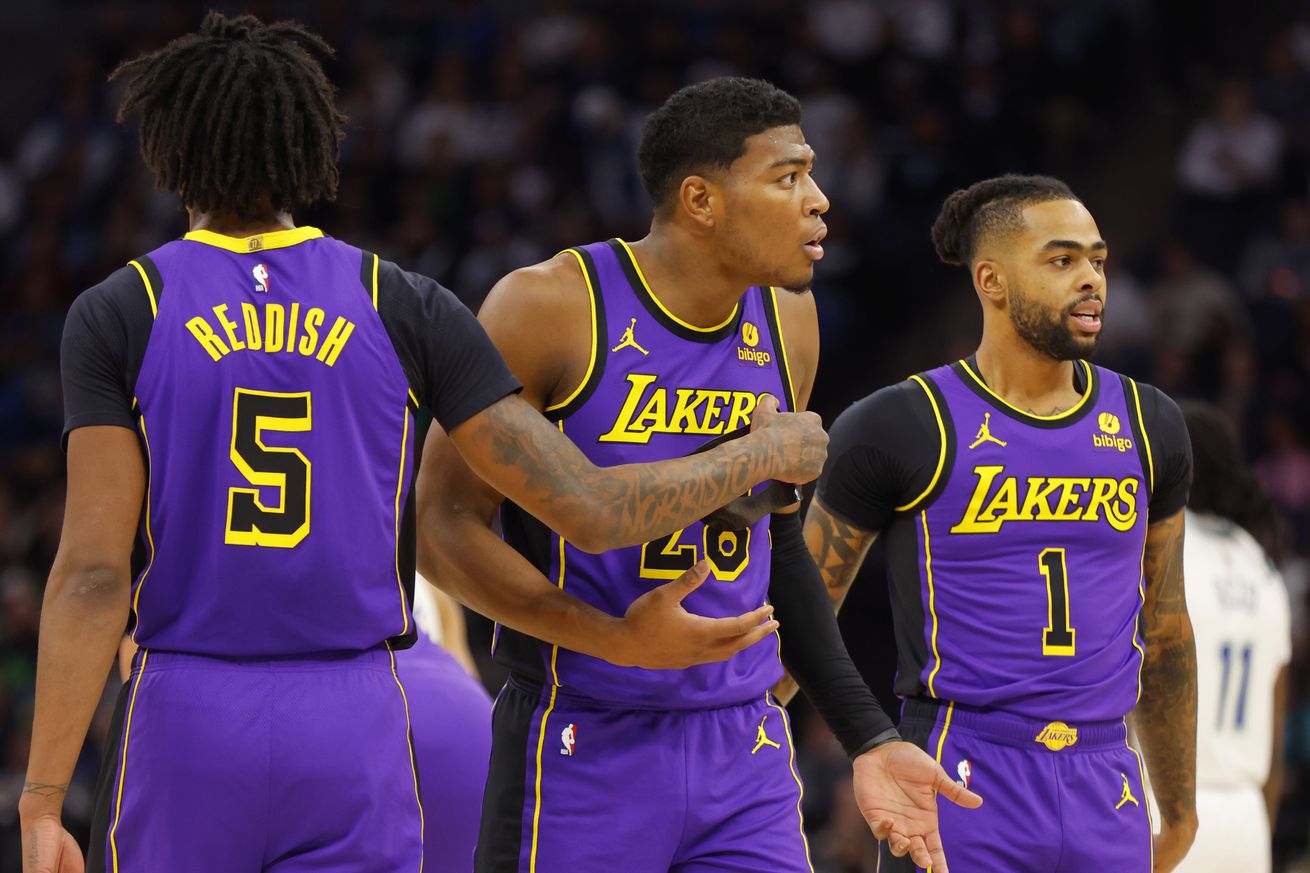
December 15 is the start of “unofficial trade season” in the NBA, but help might not be on the way for the Lakers just yet.
Christmas isn’t until Dec. 25, but NBA Christmas comes 10 days earlier for trade-slop fiends.
On Dec. 15, most players who signed new contracts in the offseason become trade-eligible. That includes LeBron James, although his latest contract contains a no-trade clause that gives him full control over whether the Lakers could send him elsewhere.
Despite what Kendrick Perkins says, it seems far more likely than not that King James will still don the purple and gold after the Feb. 6 NBA trade deadline.
The same can’t be said about the rest of the roster, though. Jake Fischer of The Stein Line recently reported that L.A. “is looking to fortify its frontcourt and add perimeter defense” ahead of this year’s trade deadline. Kyle Kuzma, Day’ron Sharpe and Jonas Valančiūnas have all popped up as possible Lakers trade targets and more will inevitably arise over the coming weeks.
Since the Lakers were relatively quiet in free agency this year, most of the roster is already trade-eligible. In fact, LeBron and Max Christie are the only two who aren’t. LeBron will become trade-eligible on Sunday — although, again, he’s likely staying put — while Christie will be on Jan. 15 since the Lakers used Bird rights to sign him to a much larger contract than his previous deal.
However, the aprons will complicate what the Lakers can do by the trade deadline.
How the aprons limit the Lakers’ options
James took slightly less than a max contract this offseason to keep the Lakers below the $188.9 million second apron. If they were above that line, they wouldn’t be allowed to aggregate contracts in trades, which would be a death knell for their ability to acquire anyone earning $20 million or more this season. Aside from James and Anthony Davis, D’Angelo Russell is the Lakers’ next-highest-paid player at $18.7 million.
The Lakers are only $30,000 below the second apron, so they don’t have much wiggle room in that regard. However, since they’re already well above the first apron, they can’t take back more salary in a trade than they send out. In other words, there’s no way for them to cross the second apron via trade.
The bigger issue will be if the Lakers swing a deal with more players going out than coming in. The CBA requires teams to have at least 14 players on standard contracts (not counting two-way players). Teams that fall below that number can only stay below it for two consecutive weeks at a time and 28 days in total.
Minimum contracts pro-rate based on the number of days left in the regular season, so anyone the Lakers sign wouldn’t earn the full $2.1 million that players on minimum deals received this past offseason. However, signing a single player to a minimum contract will push the Lakers over the second apron, prohibiting them from aggregating contracts in trades.
An order-of-operations issue
While Dec. 15 is the unofficial start of trade season — and both the Golden State Warriors and Indiana Pacers wasted no time kicking it off — the Lakers might be forced to wait until closer to the trade deadline before joining the action. They could swing a 2-for-1 or 3-for-2 deal now, but any trade in which they send out at least two more players than they take back will force them to sign someone within two weeks, thus pushing them over the second apron.
Once the Lakers get closer to the trade deadline, that’ll be less of an issue. From a trade perspective, it won’t matter if they cross the second apron after the deadline passes. Once the regular season ends, the aggregation restrictions would no longer apply to the Lakers as long as they project to be below the second apron in 2025-26. Aggregating two contracts in an offseason trade would hard-cap them at the second apron, though.
Granted, the Lakers still might prefer to stay below the second apron to avoid the accompanying draft-pick penalties. If they cross it this year, they wouldn’t be allowed to trade their 2032 first-round pick. And if they stayed over the second apron in any of the next three seasons, that 2032 pick would automatically move to the bottom of the first round.
None of these apron considerations would prevent the Lakers from pulling off a 1-for-1 swap like the Warriors just did with De’Anthony Melton and Dennis Schröder. They could even package two salaries for someone on a larger contract if they’re willing to ride with 14 players on standard contracts for now. This is where having Bronny James, along with Maxwell Lewis and Jalen Hood-Schifino, on a standard contract doesn’t help.
But if the Lakers are looking to swing a blockbuster deal—like, say, for Jimmy Butler?—the aprons might force them to wait until much closer to the Feb. 6 trade deadline.
Unless otherwise noted, all stats via NBA.com, PBPStats, Cleaning the Glass or Basketball Reference. All salary information via Salary Swish and salary-cap information via RealGM.